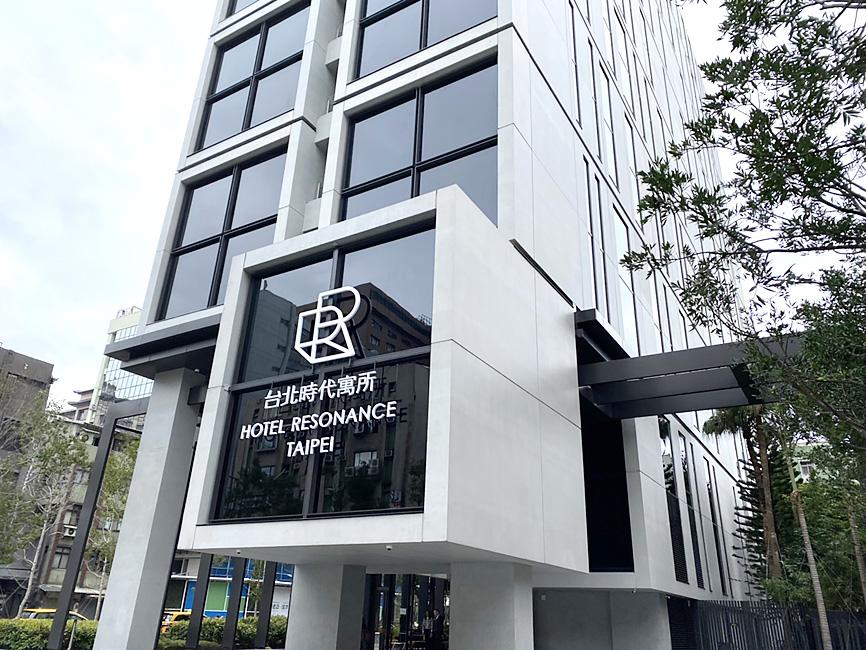US hotel operator Hilton Worldwide Holdings is next month to launch its third property in the nation, Hotel Resonance Taipei (台北時代寓所), despite the COVID-19 pandemic that has diminished international travel.
Hotel Resonance Taipei is a joint venture between Tapestry Collection by Hilton and Tainan-based Prince Housing and Development Corp (太子建設) to cater to technology-savvy business and leisure travelers.
Located on Taipei’s Linsen S Road near the MRT Shandao Temple Station, the hotel — which features 175 guestrooms, a Starbucks cafe, a wellness spa and other amenities — is available for reservations from NT$3,360 (US$116.62) per night ahead of its opening.

Photo: CNA
The property sits on a 1,091 ping (3,607m2) lot, the superficies rights of which Fubon Life Insurance Co (富邦人壽) won for NT$2.61 billion in April 2013 and later leased it to Prince Housing and Development.
Hotel Resonance Taipei is Prince Housing and Development’s second lodging facility after W Hotel in Taipei’s prime Xinyi District (信義).
It is the first hotel under the Tapestry brand in the Asia-Pacific region, reflecting confidence on the part of the US hotelier about the region’s tourism market.
Hotel executives declined to speculate on occupancy and room rates for the first year after the opening, but said they hoped that independent tourists would account for 90 percent of its customers after the world emerges from the COVID-19 pandemic.
The convenient location, just one stop from the Taipei Main Station, Michelin-star restaurants and popular tourist attractions, would lend support to its business, hotel executives said.

MULTIFACETED: A task force has analyzed possible scenarios and created responses to assist domestic industries in dealing with US tariffs, the economics minister said The Executive Yuan is tomorrow to announce countermeasures to US President Donald Trump’s planned reciprocal tariffs, although the details of the plan would not be made public until Monday next week, Minister of Economic Affairs J.W. Kuo (郭智輝) said yesterday. The Cabinet established an economic and trade task force in November last year to deal with US trade and tariff related issues, Kuo told reporters outside the legislature in Taipei. The task force has been analyzing and evaluating all kinds of scenarios to identify suitable responses and determine how best to assist domestic industries in managing the effects of Trump’s tariffs, he

TIGHT-LIPPED: UMC said it had no merger plans at the moment, after Nikkei Asia reported that the firm and GlobalFoundries were considering restarting merger talks United Microelectronics Corp (UMC, 聯電), the world’s No. 4 contract chipmaker, yesterday launched a new US$5 billion 12-inch chip factory in Singapore as part of its latest effort to diversify its manufacturing footprint amid growing geopolitical risks. The new factory, adjacent to UMC’s existing Singapore fab in the Pasir Res Wafer Fab Park, is scheduled to enter volume production next year, utilizing mature 22-nanometer and 28-nanometer process technologies, UMC said in a statement. The company plans to invest US$5 billion during the first phase of the new fab, which would have an installed capacity of 30,000 12-inch wafers per month, it said. The

Taiwan’s official purchasing managers’ index (PMI) last month rose 0.2 percentage points to 54.2, in a second consecutive month of expansion, thanks to front-loading demand intended to avoid potential US tariff hikes, the Chung-Hua Institution for Economic Research (CIER, 中華經濟研究院) said yesterday. While short-term demand appeared robust, uncertainties rose due to US President Donald Trump’s unpredictable trade policy, CIER president Lien Hsien-ming (連賢明) told a news conference in Taipei. Taiwan’s economy this year would be characterized by high-level fluctuations and the volatility would be wilder than most expect, Lien said Demand for electronics, particularly semiconductors, continues to benefit from US technology giants’ effort

‘SWASTICAR’: Tesla CEO Elon Musk’s close association with Donald Trump has prompted opponents to brand him a ‘Nazi’ and resulted in a dramatic drop in sales Demonstrators descended on Tesla Inc dealerships across the US, and in Europe and Canada on Saturday to protest company chief Elon Musk, who has amassed extraordinary power as a top adviser to US President Donald Trump. Waving signs with messages such as “Musk is stealing our money” and “Reclaim our country,” the protests largely took place peacefully following fiery episodes of vandalism on Tesla vehicles, dealerships and other facilities in recent weeks that US officials have denounced as terrorism. Hundreds rallied on Saturday outside the Tesla dealership in Manhattan. Some blasted Musk, the world’s richest man, while others demanded the shuttering of his